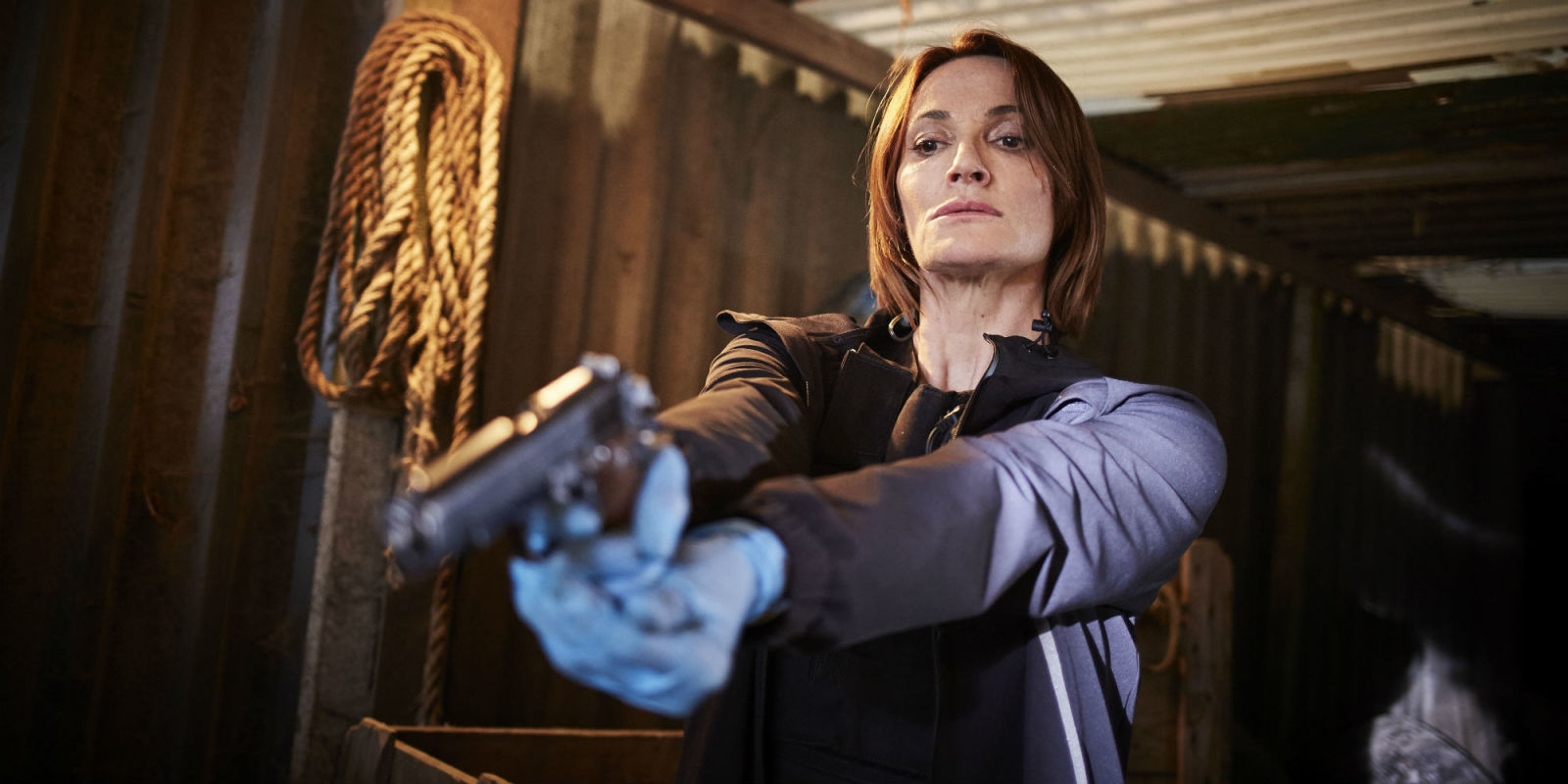 ★★★½
★★★½
“Black to basics.”
Thanks to Dieter for pointing me in the direction of this series, whose 24 episodes feel like a bit of a throwback to the days when watching anime felt hard-edged and dangerous, almost a subversive act. Mind you, this actually came out in 2006, so I guess it’s actually something of a throwback, full stop. [Random aside of no relevance to anything much: startled to realize today it’s more than eight years since Salt came out. Would have sworn it was only about three, tops] It’s hyper-violent, clearly for mature viewers only, and its multiple action heroines possess generally poor attitudes. Clearly up my street!
It takes place in what I’m going to assume is a somewhat alternate reality, where the Thai city of Roanapur has become a modern-day equivalent to Tortuga, the 17th-century pirate haven in the Caribbean. It’s a free-fire zone where organized crime operates with impunity, including Japanese, Chinese, Russian, Colombian and Italian groups, along with all the necessary “support services,” from gun-runners to brothels. Lagoon Company are one such, mostly specializing in smuggling goods, people or whatever needs to be moved quietly around. Into this setting falls the unfortunate Rock (Namikawa), a Japanese salaryman on business, whose ship is boarded by Lagoon, and he is taken hostage. After his company abandons him, to conceal the shady business they were doing, he joins Lagoon as an accountant-interpreter-negotiator-factotum. He’s in for a culture shock.
Leading the parade of counter-heroines is the Chinese-American Revy (Toyoguchi), who is Lagoon’s main enforcer, and loves her job, which she carries out enthusiastically, with the slightest provocation. She’s a fascinating character: Revy has absolutely no scruples about blowing away anybody who gets in her way, and in “normal” society would be far beyond the pale. However, in Roanapur, she’s just one among a myriad of similar types – there, scruples are likely to get you killed – and her unswerving loyalty to the rest of Lagoon, and Rock in particular, are a redeeming quality. She prefers to wield, with extreme prejudice and skill, a pair of modified Beretta 92FS’s, and Revy’s ambidextrous skill has earned her the nickname “Two Hand” around town.
 If she were the only candidate, this might end up being a bit of a borderline entry, but over the 24 episodes in the two series (there’s another five-episode arc I haven’t seen, Roberta’s Blood Trail, which came out in 2010), Revy is joined by a number of other, morally ambiguous women, all of whom are more than comfortable with firearms:
If she were the only candidate, this might end up being a bit of a borderline entry, but over the 24 episodes in the two series (there’s another five-episode arc I haven’t seen, Roberta’s Blood Trail, which came out in 2010), Revy is joined by a number of other, morally ambiguous women, all of whom are more than comfortable with firearms:
- “Balalaika” – the pseudonymous head of Hotel Moscow, the Russian crime group under whom Lagoon frequently operate. She’s a veteran of the Soviet occupation of Afghanistan, which left her with serious burns. She got her name from the sniper rifle which was her weapon of choice, and often calls upon her ex-Army colleagues when reinforcements are needed.
- Eda – a drinking buddy of Revy, she’s a nun in the Church of Violence a.k.a. the Rip-off Church. They are perhaps the premier gun-running outfit in Roanapur, who count Lagoon among their customers, and you interfere with the Church or its leader Yolanda, at your own peril.
- Roberta – the maid of the Lovelace family, one of the leading South American cartels. When its scion, Garcia, is kidnapped, Roberta goes on the hunt. Turns out she’s actually a former FARC guerrilla, who had been trained as an assassin in Cuba, and proves capable of fighting Revy to a time-limit draw.
- Gretel – one of two Romanian orphans, who may be the most screwed-up characters in the whole show, due to their background in child porn and worse. [‘Snuff said, shall we say…] While life is generally cheap in this series, she and her brother Gretel take sadistic and visceral pleasure in torturing their victims, extreme even for this show.
- Yukio Washimine – daughter of a yakuza boss. She takes over the group after the incumbent is killed by Balalaika, despite Rock’s efforts to prevent this.
There are all, in their own way, interesting (if largely damaged, in some cases severely) characters, who have enough potential that they could each merit their own series. Add them to Revy, and its an impressive line-up, even if some only appear for a couple of parts. The structure of the series generally has each arc occupying two episodes, though the Washimine storyline occupies the final six. It’s a good approach, allowing for a bit more expansion than the 25-minute format usually permits. My main gripe is the near-total lack of character development over the two seasons. Revy, Dutch and just about everyone else are the same at the end of the show as at the beginning. There’s no sense they’ve learned anything from their experiences, and even Rock has simply settled into his new life with barely a ripple. The show seems more interested in their past, than their future.
It is still a lot of fun to watch – admittedly, you need to suspend your disbelief in the way gun battles work. But if, like me, you’re a fan of John Woo films like A Better Tomorrow (an obvious and admitted influence), then the remarkable invulnerability to bullets shown by Revy, etc. will not be an issue. Having cut my anime fandom teeth on the likes of Wicked City and Vampire Hunter D, this plays like the organized crime equivalent, and provides an enjoyable blast from the past.
Dir: Sunao Katabuchi
Star (voice): Megumi Toyoguchi, Daisuke Namikawa, Tsutomu Isobe, Mami Koyama






 My name is Alyse Winters. I used to be a
My name is Alyse Winters. I used to be a  It has been a while since I’ve scraped the bottom of the barrel of Mexploitation cinema: all those telenovelas don’t count, generally being well-produced and with reasonable production values. Just
It has been a while since I’ve scraped the bottom of the barrel of Mexploitation cinema: all those telenovelas don’t count, generally being well-produced and with reasonable production values. Just  The half-elven Lady Bethany has shattered the glass ceiling for women in the military forces, rising to third in command, a position she has achieved on her own merit. Of course, it probably didn’t hurt that she is daughter of the goddess Apaxia, although her ancestry causes as many problems as it solves. This is due partly to some pesky secret prophecies which outline – in typically vague prophetic ways, with references to the “Diamond” and the “Viper” – Bethany’s very important place in future events, and partly her estranged twin sister, Sarissa. For she has turned to the dark side of magic, insanely jealous of her sister’s success, with the emphasis squarely on “insanely” there…
The half-elven Lady Bethany has shattered the glass ceiling for women in the military forces, rising to third in command, a position she has achieved on her own merit. Of course, it probably didn’t hurt that she is daughter of the goddess Apaxia, although her ancestry causes as many problems as it solves. This is due partly to some pesky secret prophecies which outline – in typically vague prophetic ways, with references to the “Diamond” and the “Viper” – Bethany’s very important place in future events, and partly her estranged twin sister, Sarissa. For she has turned to the dark side of magic, insanely jealous of her sister’s success, with the emphasis squarely on “insanely” there… ★★★½
★★★½ Three millennia previously, the Terrans landed on the planet of Ogun, and took it over. The native Iliri, though in many ways superior to the new arrivals in both mental and physical ability, ended up subjugated. They are now very definitely second-class citizens, only remembering vague legends of their once-proud past. One such is Salryc Luxx, a rare pure-bred Iliri who is a private in the army. Despite the fierce prejudice against “her kind”, she gets a try-out for the Black Blades, the military’s elite special forces. Which, it turns out, is a haven for Iliri and their supporters. Sal becomes the first woman in the unit, and her talents – including the ability to shape shift – quickly become an essential part of the team, allowing her to become one of their top covert assassins. However, her presence also causes significant static, not least her relationship with the Black Blades’ commanding officer, Blaec.
Three millennia previously, the Terrans landed on the planet of Ogun, and took it over. The native Iliri, though in many ways superior to the new arrivals in both mental and physical ability, ended up subjugated. They are now very definitely second-class citizens, only remembering vague legends of their once-proud past. One such is Salryc Luxx, a rare pure-bred Iliri who is a private in the army. Despite the fierce prejudice against “her kind”, she gets a try-out for the Black Blades, the military’s elite special forces. Which, it turns out, is a haven for Iliri and their supporters. Sal becomes the first woman in the unit, and her talents – including the ability to shape shift – quickly become an essential part of the team, allowing her to become one of their top covert assassins. However, her presence also causes significant static, not least her relationship with the Black Blades’ commanding officer, Blaec. Small world. Well, small-ish. I used to work for the same online media company as one of the scriptwriters of this, though our paths there never crossed in any meaningful sense. That’s probably about as interesting a factoid i.e. “not very”, as this film. Indeed, outside of some gratuitous strip-club breasts, it feels like it could have strayed in from a slow weekend on Hallmark. Battered wife Lindsay (Ladd) teams up with longtime stripper friend Nicole (Moore), and commit a string of armed robberies around their local area in Connecticut, their identities hidden with Halloween masks and voice-changers. They’re building up towards a big score, which will involve relieving Lindsay’s abusive husband, Seth (DeNucci) of a crisp $1.8 million dollars in cash. But increasingly, sniffing around the robberies is Detective Broza (Sizemore), a city cop who has recently been transferred to the town: Nicole starts a relationship with him, ostensibly to see how the investigation is going. But is that her real motive?
Small world. Well, small-ish. I used to work for the same online media company as one of the scriptwriters of this, though our paths there never crossed in any meaningful sense. That’s probably about as interesting a factoid i.e. “not very”, as this film. Indeed, outside of some gratuitous strip-club breasts, it feels like it could have strayed in from a slow weekend on Hallmark. Battered wife Lindsay (Ladd) teams up with longtime stripper friend Nicole (Moore), and commit a string of armed robberies around their local area in Connecticut, their identities hidden with Halloween masks and voice-changers. They’re building up towards a big score, which will involve relieving Lindsay’s abusive husband, Seth (DeNucci) of a crisp $1.8 million dollars in cash. But increasingly, sniffing around the robberies is Detective Broza (Sizemore), a city cop who has recently been transferred to the town: Nicole starts a relationship with him, ostensibly to see how the investigation is going. But is that her real motive? That this Belgian flick starts off with a dedication to Ilona Staller (a.k.a. Italian porn star, Cicciolina), artist provocateur Jeff Koons, and Traci Lorde, likely tells you it should not be taken too seriously. Certainly, the amusement to be found largely requires the viewer to be aware of the genres to which this is a homage. This is best exemplified by the
That this Belgian flick starts off with a dedication to Ilona Staller (a.k.a. Italian porn star, Cicciolina), artist provocateur Jeff Koons, and Traci Lorde, likely tells you it should not be taken too seriously. Certainly, the amusement to be found largely requires the viewer to be aware of the genres to which this is a homage. This is best exemplified by the  The above line of dialogue is a perfect litmus test for what you’ll think of this. If your reaction is a derisive snort, this pair of hour-long items – I have qualms about calling them anything as high-minded as “feature films” – is probably not for you. And I cheerfully admit, snorting is probably the default, and understandable, reaction. If, on the other hand, you are giddy with anticipation at the very thought, then I probably cannot recommend it highly enough.
The above line of dialogue is a perfect litmus test for what you’ll think of this. If your reaction is a derisive snort, this pair of hour-long items – I have qualms about calling them anything as high-minded as “feature films” – is probably not for you. And I cheerfully admit, snorting is probably the default, and understandable, reaction. If, on the other hand, you are giddy with anticipation at the very thought, then I probably cannot recommend it highly enough. In the film’s defense, it’s not clear quite how post-apocalyptic this is meant to be, since we don’t see anything of the world at large. Everything takes place inside a stretch of desert which has been used, apparently for some time, as a dumping ground for the dregs of society. Into this environment is dropped Arlen (Waterhouse), who soon gets first-hand experience of the situation, when a cannibal mother and daughter capture her, and cut off an arm and a leg. She escapes, and is found and rescued by the Hermit (Carrey), who brings her to Comfort, the nearest the zone offers to civilization. When she’s well again, Arlen returns to take revenge on the mother, but believing the daughter to be innocent, takes her back to Comfort. Which provokes the ire of Miami Man (Monoa), a tattooed behemoth who turns out to be the girl’s father, and wants her back.
In the film’s defense, it’s not clear quite how post-apocalyptic this is meant to be, since we don’t see anything of the world at large. Everything takes place inside a stretch of desert which has been used, apparently for some time, as a dumping ground for the dregs of society. Into this environment is dropped Arlen (Waterhouse), who soon gets first-hand experience of the situation, when a cannibal mother and daughter capture her, and cut off an arm and a leg. She escapes, and is found and rescued by the Hermit (Carrey), who brings her to Comfort, the nearest the zone offers to civilization. When she’s well again, Arlen returns to take revenge on the mother, but believing the daughter to be innocent, takes her back to Comfort. Which provokes the ire of Miami Man (Monoa), a tattooed behemoth who turns out to be the girl’s father, and wants her back.